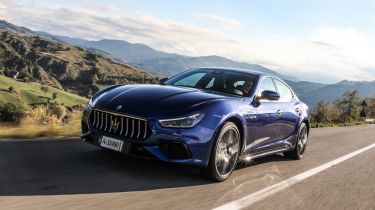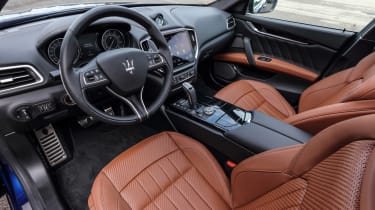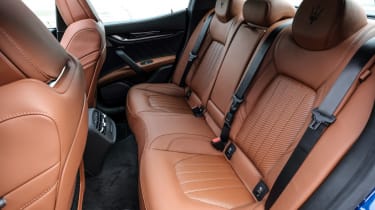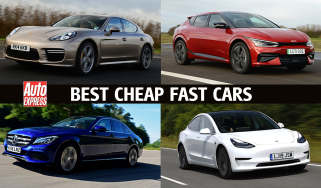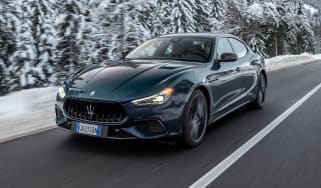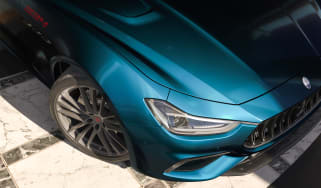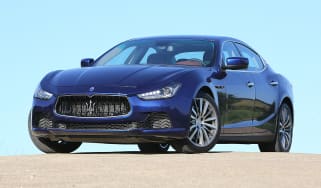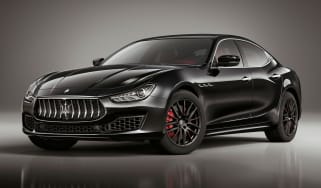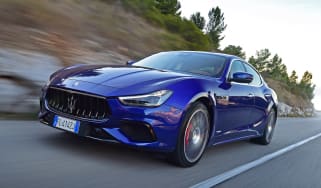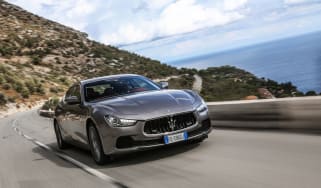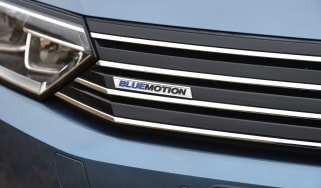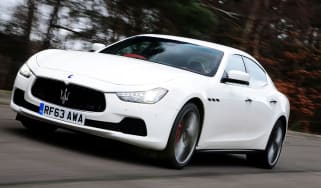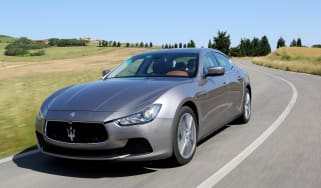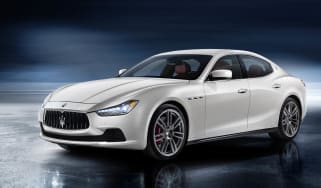Maserati Ghibli review
The Maserati Ghibli combines style and quality with sharp handling to rival the BMW 5 Series and Mercedes E-Class

Think Maserati Ghibli and memories of a coupe and GT car come to mind, not an executive saloon. Still, Maserati claims this Ghibli saloon has what it takes to rival the best at the sporty end of the executive car class and, sure enough, it proves able when driven quickly. The Ghibli feels sufficiently sporty to justify its three-pronged badge.
The Ghibli isn’t as well built as the established, mostly German, opposition and the ride is on the firm side too. This Maserati certainly looks the part, however, making its rivals appear rather ordinary by comparison.
Although shorter than the Quattroporte, the Ghibli shares its double-wishbone front and five-link rear suspension set-up, plus it’s available optionally with Maserati’s Skyhook adaptive damping. New electronic steering was added as part of the 2017 facelift, along with a subtle facelift, improved safety tech and the introduction of two new trim levels.
Prices start from around £58,000 and there are four versions to choose from: the standard Ghibli, Ghibli S, Ghibli Hybrid and Ghibli Trofeo. In addition, buyers can upgrade their Ghibli with GranLusso and GranSport trim levels - each one offers a distinct flavour; one focused on luxury, the other on sport.
Used - available now

2020 Vauxhall
Corsa Electric
44,960 milesAutomaticElectric
Cash £9,199
2023 Peugeot
208
16,998 milesAutomaticPetrol1.2L
Cash £14,755With the Ghibli, the iconic Italian supercar manufacturer now has a challenger in the big-selling executive car class. The car’s arrival also saw a diesel engine offered in a Maserati for the first time, although this has now been replaced in the lineup with a petrol mild-hybrid version.
Maserati badge or not, the Ghibli rivals the BMW 5 Series, Audi A6 and Mercedes E-Class, looking sharp and interesting in comparison. The heritage that comes with the Maserati badge means it should deliver on the road too, although fans will remember the Ghibli as both the glamorous Giugiaro-designed and V8-powered GT car launched in 1966 and the boxy mid-1990s four-seat coupe styled by Gandini - rather than an executive saloon.
The 271bhp 3.0-litre diesel is no longer available, with Maserati choosing to go for mild-hybrid petrol power in the shape of a 2.0-litre, four-cylinder model delivering 325bhp. Two 3.0-litre twin-turbo V6 petrol engines remain, in either standard 345bhp or 424bhp 'S' form, while at the top of the range is the 3.8-litre V8 Ghibli Trofeo with a staggering 572bhp.
Maserati will be hoping that the desirable brand image and exotic styling will continue to pull at the heartstrings of buyers. They certainly won’t want for equipment, with leather seats, auto climate control, xenon headlamps, parking camera and touchscreen sat-nav, all included as standard.
Engines, performance and drive
The Maserati Ghibli now drives a lot better than it once did, courtesy of the new electric steering. It replaces the old conventional hydraulic setup, and while it isn’t perfect – it can feel a little inert – it’s a step up from before.
But as a pure driver’s car, it doesn’t quite hit the spot. The ride quality is mediocre, even with the optional Skyhook electronic damping system, while the Ghibli never feels that quick, regardless of the engine choice. The chief problem is the weight, with the Ghibli knocking on for nearly two-tonnes.
Take it easy, and the Maserati is a mixed bag. Firm suspension fidgets and shimmies over bumps where the Jaguar XF feels stable and solid, while the sharp brake pedal also takes some getting used to. The car is great on a twisting B-road, but the rest of the time it’s too firm and unsettled to be a relaxing cruiser.
Engines, 0-60 acceleration and top speed
The entry-level Ghibli model uses a 2.0-litre, four-cylinder petrol powertrain with an electric supercharger and 48-volt mild hybrid assistance. The engine develops 325bhp and 450Nm of torque, which means 0-62mph in 5.7 seconds and a top speed of 158mph.
Engaging drive with the shifter is tricky, as you need to be deliberate when pulling the trigger to select it, otherwise you’re left in neutral, which can be frustrating. Another niggle is that it’s easy to accidentally knock the lever across from drive to Sport mode, because it’s closely positioned just ahead of the climate and infotainment controls.
If it’s real excitement you’re after, the Ferrari-built twin-turbo V6 petrol will be more to your liking. Even in its less-potent 345bhp form, it delivers sharp throttle response and a much more Maserati-esque growl from the quad exhausts. 0-62mph arrives in 5.5 seconds, or 4.9 seconds in the 424bhp Ghibli S. Top speeds for the petrol models are 166mph and 177mph respectively.
The fire-breathing V8 Ghibli Trofeo takes things on even further with 572bhp and a sprint time of 4.3s. Top speed is also superior at 203mph.
MPG, CO2 and running costs
The Ghibli diesel model was, in terms of fuel bills, the cheapest Maserati to run by quite some margin. Claimed economy of 48mpg and CO2 emissions of 158g/km, were still not particularly competitive with the BMW 530d, however.
The 2.0-litre Hybrid car offers around 33mpg and 192g/km of CO2, which Maserati says reduces emissions by around 25% compared with the standard V6 Ghibli - although still not not enough to make it an attractive proposition for company car users.
If you're considering either of the twin-turbo V6 petrol versions, then be prepared for increased running costs. Both average around 21mpg, with CO2 emissions between 254-268g/km.
You'll need even deeper pockets for the V8 Trofeo as it averages just 19mpg, although this figure will drop like a stone the moment you flex your right foot. CO2 emissions are from 279g/km.
Insurance groups
As well as high dealer servicing costs, the Ghibli also attracts high insurance premiums – even the lowest-powered model falls into the highest possible insurance group 50. The BMW 530d is in group 45.
Depreciation
Maseratis of old have suffered pretty badly in terms of residual values thanks to a reputation for unreliability and problems with build quality. The modern era models may have debunked much of that old reputation, but it still seems likely that high maintenance and running costs, the model’s relative rarity and limited dealer network will be off-putting to future used car buyers.
Over an average three-year/36,000-mile ownership period, you can expect the Ghibli to hold onto around 42% of its original value. The V8 Trofeo model suffers a little more at resale time, with around 35-38% retained.
To get an accurate valuation on a specific model check out our free car valuation tool...
Interior, design and technology
Not many cars look as dramatic as the Ghibli. The low snout takes inspiration from the GranTurismo coupe, while the distinctive trident badge (restyled for the 2021 model year) and small headlights provide a menacing look. Its front wings rise over the wheels and behind the arches is a set of three false air vents – a typical Maserati design touch – while the low roof and small glass area add to the sporty feel.
The Ghibli isn’t quite as well resolved at the rear, despite a light refresh in 2020. Maserati badges on the C-pillars are a traditional touch, but the narrow rear screen, rounded bootlid and small LED lights give it a bit of a dumpy look. Still, the quad exhausts do bring a little excitement.
There’s plenty of luxury and leather, but interior quality doesn’t feel quite on a par with its rivals. The leather-topped dashboard adds a touch of class, but the switchgear is a let-down. The hard plastic buttons aren’t very nice to use, while the window switches on the driver’s door look like poor copies of Mercedes items. The centre console gets a textured natural wood finish, but if that’s not to your taste, gloss and carbon fibre finishes are available.
Sat-nav, stereo and infotainment
The Ghibli benefits from technology updates introduced in 2020. The driver instruments now incorporate some new digital tech, with a driver information display between the speed and rev dials.
The central touchscreen has grown to 10.1-inches and features a new user interface with updated graphics. The Ghibli is also compatible with Maserati Connect. This allows owners to control certain vehicle functions remotely via a smartphone app.
Although Apple CarPlay is standard, Maserati offers either the Harman Kardon or Bowers & Wilkins audio systems at extra cost.
Practicality, comfort and boot space
The Ghibli is only available as a four-door saloon, but its swoopy styling makes it more of a stylish-looking rival to the more ‘regular’ appearance of the 5 Series or E Class.
Up front, there’s lots of seat and wheel adjustment, although the offset pedals mean your legs are angled away from your arms – it’s a good job the car is only available as an auto, as the addition of a clutch pedal would exacerbate the problem.
An air-conditioned glovebox, large door pockets, a centre console storage bin and 60/40 split rear seats help make the interior a genuinely useable space, and the luxurious interior trim creates a comfortable ambience. The car is quiet and refined while driving, although pressing the Sport button makes the exhaust a lot more intrusive. The ride quality is less than perfect on the UK’s increasingly pot-holed roads, which some owners will find irritating too.
Dimensions and size
With an overall length of 4,971mm the Maserati Ghibli is just a shade longer than the Jaguar XF, although the Italian exec is around 35mm narrower.
Leg room, head room & passenger space
While there’s plenty of room up front, rear space is poorer than in the Jaguar XF. The heavily sculpted outer seats mean the middle seat feels more like a perch and is pretty much unusable apart from for short journeys. Head and legroom are also tight, the swoopy rear roofline not helping accommodation all.
Still, the seats are comfortable, and the centre armrest folds to reveal a storage area with two cup-holders, plus USB and 12V sockets.
Boot space
The Maserati’s 500-litre boot is 40 litres down on the Jaguar XF’s, but has a wider opening and lower lip. The back seats split 60:40, although the through hatch is narrower, plus there’s some exposed metal around the opening.
Reliability and safety
Even though the Ghibli was all-new in 2014, it uses a lot of running gear that’s been seen in other models. The (now discontinued) diesel engine has been used in the Jeep Grand Cherokee and other Fiat-Chrysler products for instance, while the platform is shared with the Quattroporte. The eight-speed box is from German company ZF, and has seen service in a raft of rivals, so it should be reliable, too.
That’s all very well in theory, however, but sadly the build quality is no more than okay – the doors don’t exactly shut with a German-style reassurance, while our test car had noisy power steering and squeaky brakes. The infotainment system revealed a few foibles, too, leaving us with an overall impression that the Ghibli lacks the solid quality feel of most of its rivals.
Seven airbags, anti-whiplash headrests and a chassis with hot-formed high-strength steels in crucial crash zones were all designed for unbeatable occupant protection from the outset, says Maserati.
The 2017 facelift added a range of new electronic safety features, such as adaptive cruise control, traffic sign recognition, ‘intelligent’ LED headlights, lane keep assist, steering assist and brake force assist.
Euro NCAP was suitably impressed – even before the new driving assistance systems – awarding the Ghibli a five-star crash test rating in its 2013 test. Adult occupant safety was assessed at an impressive 95% and child passenger protection at 79%.
Warranty
The Maserati comes with a three-year unlimited mileage warranty – par for the course in this sector, and the same cover as you’d get on a BMW or Mercedes. Audi and Lexus limit cover to 60,000 miles over three years.
Servicing
The biggest stumbling point will be servicing costs. Maserati is a prestige brand, so it expects owners to pay prestige prices. The manufacturer has introduced pre-paid servicing packages to help with the cost of scheduled maintenance. Just remember though, that there are only 14 dealer outlets all told.
